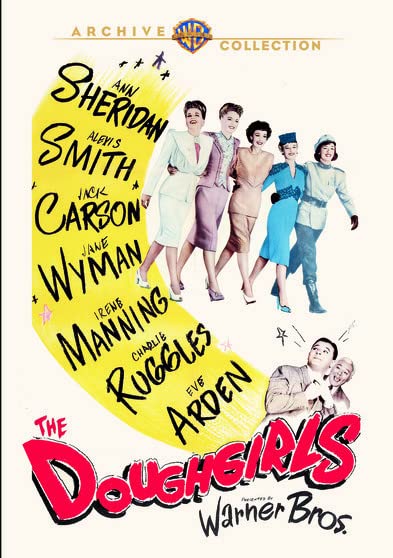
In those glorious, long gone days before female-driven movies like Pitch Perfect and Bridesmaids (to say nothing of the forthcoming Ghostbusters spin-off, I’m sure) began infecting cineplexes near and far with stories that relied too heavily on such surefire ticket-selling gimmicks such as fart jokes, an assembly of some of American cinema’s finest actresses was something worth taking note of. Particularly when said actresses weren’t necessarily “comediennes” per se (and didn’t “let one” for the sake of a laugh). Such a formula can be seen at work in the Warner Bros. 1944 comedy The Doughgirls: a tale for the ladies ‒ as written by a man, naturally ‒ which began as a Broadway play in 1942, where it ran for 671 performances before wrapping up just four months before the motion picture version took over.
Our madcap tale begins with a seemingly innocent marriage of government worker Arthur Halstead (Jack Carson) and bubble-headed brunette Vivian Marsden (an undeniably adorable Jane Wyman), shortly before the two venture off to Washington D.C. so that the mister may begin his new high-profile position. However, this is wartime D.C. ‒ something that will surely take modern audiences for a loop ‒ as there was a severe housing shortage afoot at the time. And it isn’t until Arthur and Vivian arrive to claim their hotel bridal suite reservation that we discover how dire the situation is, as dozens of desperate men and women (consisting of every form of John Hamilton and Fred Kelsey there is, including the real deals themselves!) flock out of every nook and cranny once they hear a room may be becoming available.
Alas, kicking out the current occupants of the room ‒ the newlywed Cadman coupling of headstrong redhead Edna (Ann Sheridan) and soybean businessman Julian (John Ridgley) ‒ proves to be a task even God wouldn’t take on. Edna refuses to vacate her lofty pad, especially once we find out she and Vivian are old pals from their days as showgirls. The number of lovely ladies quickly multiplies when another one of their cohorts ‒ newly-nuptialed Nan (Alexis Smith) ‒ pops in, only to settle down while she waits for her hubby (Craig Stevens) to show up so they can perform a certain pesky, lawful procedure: the actual process of getting married itself. For you see, even though the blonde is claimed as a bride, it hasn’t been finalized yet. In fact, we soon discover a similar calamity has befallen all of our heroines!
Unwanted roommates of every disposition soon start to infiltrate the busiest hotel room in D.C. ever (which is saying something, when you stop to think about all of the escorts and politicians that are in that town today), including Julian’s not-yet-ex-wife (Irene Manning); Arthur’s love-starved employer (the great Charles Ruggles, who somehow managed to age a good thirty years between 1934’s Murder in the Private Car and this feature from ’44), who has the hots for Vivian; a cowardly radio correspondent (Alan Mowbray) who reports from well in the back of all of the fronts; and a visiting Russian sniper Natalia Moskoroff (Eve Arden, who manages to steal every single scene she’s in, without the aid of her ever-present rifle). That’s right: this movie is so old, the Russians are our friends here!
Contributing to the madness of Joseph Fields’ original play ‒ as adapted for the big screen by an arsenal of witty writers, including Sam Hellman (My Darling Clementine, The Horn Blows at Midnight) ‒ are John Alexander (best known for his memorable performance in Arsenic and Old Lace as Teddy), Barbara Brown, Donald MacBride, Regis Toomey, Francis Pierlot, and a funny-looking little fat man by the name of Joe DeRita, making his film debut here as a poor sap who is hurtin’ bad for a good forty winks. Mark Stevens and future Gilligan’s Island co-star Natalie Schafer (who was probably the only person from the original play ‒ where she had the Irene Manning part ‒ to appear in the film version, even if you don’t see her) are two of the film’s many uncredited extras.
Full of well-delivered wisecracks and a fair bit of heart (something the crude and crass comedies of today so achingly lack), The Doughgirls foregoes the self-conscious love for patriotism many World War II-era movies (especially the comedies). Whereas something like Abbott and Costello’s Buck Privates ‒ a movie I dearly love, don’t get me wrong ‒ is a World War II comedy, The Doughgirls is a comedy in World War II. Its duty was not to sell war bonds (although there is a good gag on how to do so) or inspire America’s dutiful citizens to keep up the good fight for what was right, but rather to help its physically, financially, and emotionally overtaxed audiences relax for a few minutes ‒ even though the whole movie is so zany, not even Joe Besser’s sleepy-headed replacement could doze off through it.
The Warner Archive Collection brings us this joyous wartime comedy (yes, you will hear mention of the “Japs” in this film ‒ there was still a war going on, after all ‒ so fair warning to those of you with sensitivities towards such things) to DVD as part of its never-ending Manufactured-on-Demand line. The quality of this underrated gem ‒ presented in its 1.37:1 aspect ratio ‒ is as beautiful as its lead starlets throughout, and the 2.0 mono English audio delivers every quip as clear as can be. The original theatrical trailer is included as a bonus item, though any movie that manages to wrangle up a cast like this and keep its sanity intact ‒ even if its characters have been removed of such a mental luxury ‒ is quite special in its own right.
Highly recommended for those of you who are looking for a good, classic, female-driven comedy that doesn’t have to stoop so low as to raise up a stink.